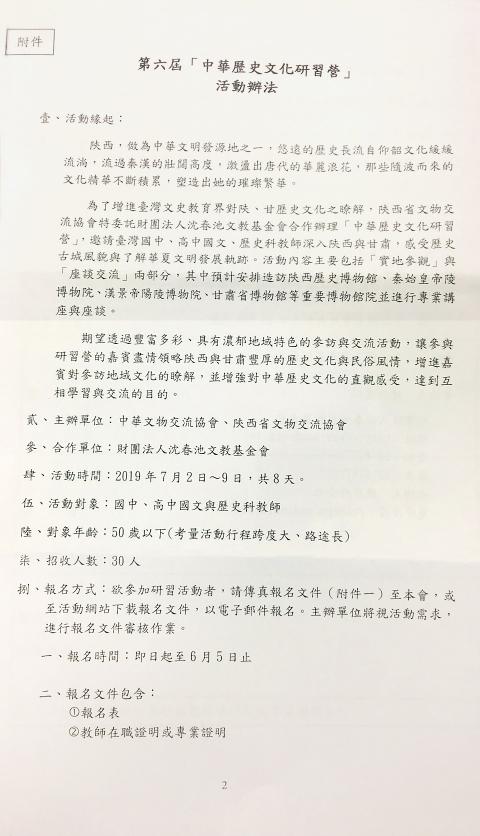The Ministry of Education should have a standing policy and administrative measures to combat the increasingly severe cultural and literary “united front” tactics employed by China, a national security source said.
The pro-China Administration of Cultural Heritage and the Shaanxi Provincial Bureau of Cultural Heritage is commissioning the Taipei-based Sheen Chuen-chi Cultural and Educational Foundation to host a “Zhonghua History and Culture Workshop” in July, the source said, citing Mainland Affairs Council sources.
High-school teachers in the subjects of Mandarin and history would be invited to give talks at the workshop in China’s Shaanxi and Gansu provinces, with Beijing providing room, board and transportation, the council said.

Photo: Lee Hsin-fang, Taipei Times
While the commission is legal, it is nonetheless a move to influence high-school teachers with “united front” tactics, the source said.
The ministry should tell teachers that attending such events is not advised, as China has ulterior motives for covering their expenses, the source said.
These efforts are on the rise as restrictions for Chinese individuals coming to Taiwan grow stricter, while Taiwanese citizens going to China are relatively unhindered, due to freedom of movement as guaranteed by Taiwan’s democratic form of government, the source said.
The ministry should consider subsidizing academic-based travels or interaction to countries other than China, the source added.
The ministry should also adopt measures such as requiring all teachers to log a report to the ministry if they are going to China or disallowing teachers from taking a day off citing official business if they have accepted Chinese offers to pay for expenses, they said.
Taiwanese citizens must be aware that China will do everything in its power to attempt to subvert the nation’s sovereignty, particularly after the Chinese Communist Party issued Chinese President Xi Jinping’s (習近平) “five points” in January this year, the source said.
Democratic Progressive Party Legislator Lee Chun-hsien (李俊憲) on Saturday criticized the workshop as a cover for “united front” tactics as the administration is headed by Chinese National Cultural Heritage Administration Director Liu Yuzhu (劉玉珠).
The Sheen Chun-chi Cultural and Educational Foundation said the workshop aims to promote cross-strait interaction and the history of the “Zhonghua” people.

NATIONAL SECURITY THREAT: An official said that Guan Guan’s comments had gone beyond the threshold of free speech, as she advocated for the destruction of the ROC China-born media influencer Guan Guan’s (關關) residency permit has been revoked for repeatedly posting pro-China content that threatens national security, the National Immigration Agency said yesterday. Guan Guan has said many controversial things in her videos posted to Douyin (抖音), including “the red flag will soon be painted all over Taiwan” and “Taiwan is an inseparable part of China,” while expressing hope for expedited “reunification.” The agency received multiple reports alleging that Guan Guan had advocated for armed reunification last year. After investigating, the agency last month issued a notice requiring her to appear and account for her actions. Guan Guan appeared as required,

Japan and the Philippines yesterday signed a defense pact that would allow the tax-free provision of ammunition, fuel, food and other necessities when their forces stage joint training to boost deterrence against China’s growing aggression in the region and to bolster their preparation for natural disasters. Japan has faced increasing political, trade and security tensions with China, which was angered by Japanese Prime Minister Sanae Takaichi’s remark that a Chinese attack on Taiwan would be a survival-threatening situation for Japan, triggering a military response. Japan and the Philippines have also had separate territorial conflicts with Beijing in the East and South China

A strong cold air mass is expected to arrive tonight, bringing a change in weather and a drop in temperature, the Central Weather Administration (CWA) said. The coldest time would be early on Thursday morning, with temperatures in some areas dipping as low as 8°C, it said. Daytime highs yesterday were 22°C to 24°C in northern and eastern Taiwan, and about 25°C to 28°C in the central and southern regions, it said. However, nighttime lows would dip to about 15°C to 16°C in central and northern Taiwan as well as the northeast, and 17°C to 19°C elsewhere, it said. Tropical Storm Nokaen, currently

PAPERS, PLEASE: The gang exploited the high value of the passports, selling them at inflated prices to Chinese buyers, who would treat them as ‘invisibility cloaks’ The Yilan District Court has handed four members of a syndicate prison terms ranging from one year and two months to two years and two months for their involvement in a scheme to purchase Taiwanese passports and resell them abroad at a massive markup. A Chinese human smuggling syndicate purchased Taiwanese passports through local criminal networks, exploiting the passports’ visa-free travel privileges to turn a profit of more than 20 times the original price, the court said. Such criminal organizations enable people to impersonate Taiwanese when entering and exiting Taiwan and other countries, undermining social order and the credibility of the nation’s